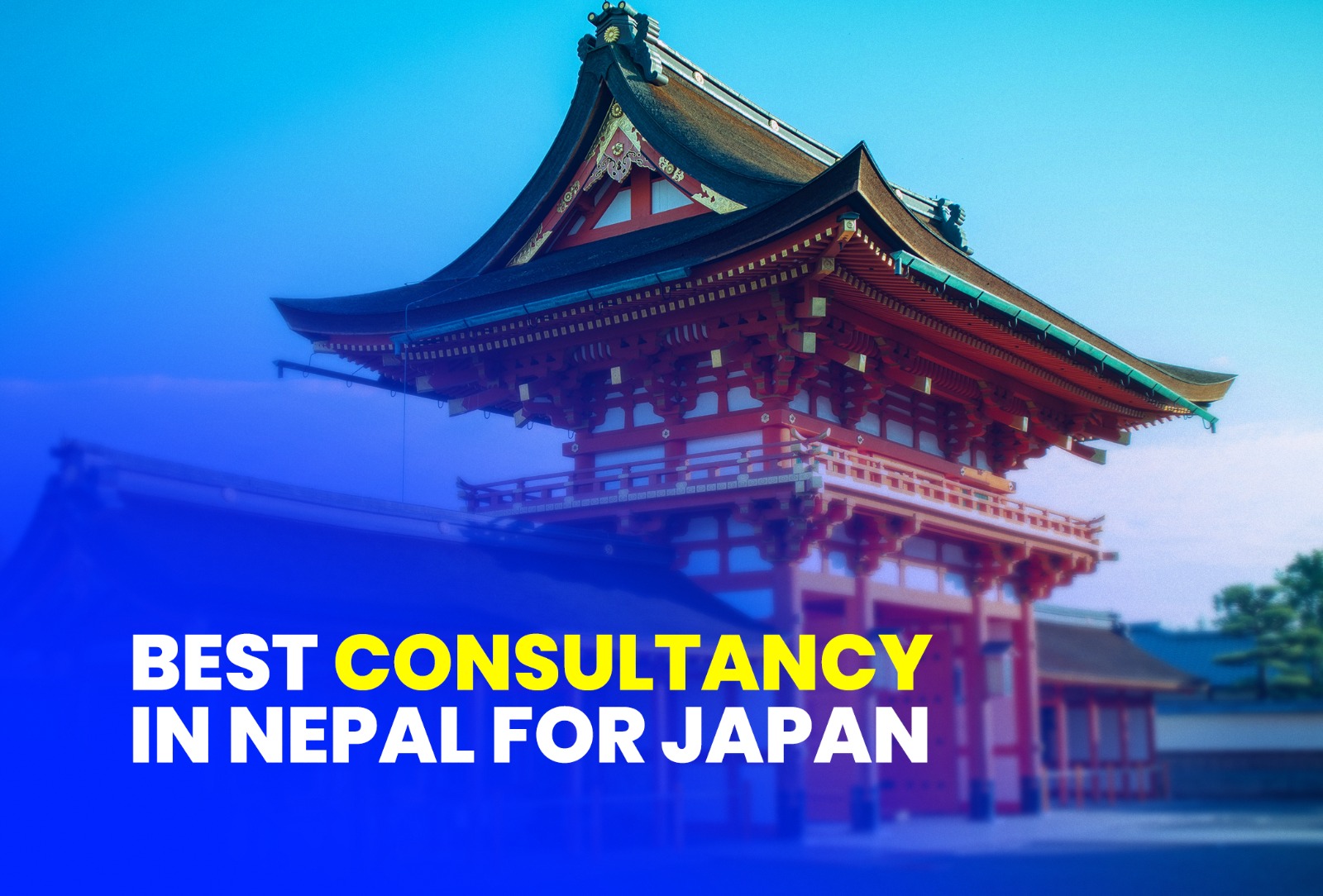.png)

Are you dreaming of studying or working in Japan? You're not alone! Every year, thousands of Nepali students and professionals set their sights on the Land of the Rising Sun. But navigating the application process, visa requirements, and cultural transitions can be overwhelming without proper guidance. That's where quality consultancies come in, they're your bridge to successfully starting your Japanese journey.
In this comprehensive guide, we'll walk you through everything you need to know about finding the best consultancy in Nepal for Japan. From the top Japanese consultancies to costs, requirements, and crucial factors to consider before making your decision, we've got you covered!
Table of Contents
Why Choose Japan for Education and Employment
The Japanese Education System: An Overview
Career Opportunities in Japan for Nepali Students
What Makes a Good Japan Consultancy in Nepal
Essential Services to Look For
Red Flags to Watch Out For
Top 10 Japanese Consultancies in Nepal
Asahi International Consultancy
Yojala
Rain Education
Hardford Education
Alight Group of Consultants
Golden Gate International Education
Sakura Education Consultancy
Tokyo Success Academy
Rising Sun Education Foundation
Mount Fuji Educational Services
Financial Considerations for Studying in Japan
Tuition Fees and Living Expenses
Scholarship Opportunities
Academic Requirements for Japanese Universities
Language Proficiency Requirements
GPA and Academic Prerequisites
Visa Application Process for Japan
Required Documents
Common Visa Challenges for Nepali Students
Conclusion: Making the Right Choice
Frequently Asked Questions
Before diving into the consultancies, let's talk about why Japan is such an attractive destination for Nepali students and professionals.
Japan boasts one of the most advanced education systems in the world, combined with cutting-edge technology and innovation. The country is home to several world-ranking universities that offer programs in English, making it increasingly accessible to international students. Beyond academics, Japan offers an unparalleled cultural experience; a fascinating blend of ancient traditions and ultramodern lifestyles.
The Japanese education system is renowned for its excellence and discipline. Universities in Japan offer a wide range of programs across disciplines, with particular strengths in engineering, technology, medicine, and business studies. The academic year typically begins in April, though some universities offer September intake as well.
Many Japanese universities now offer programs taught entirely in English, eliminating the language barrier for international students. However, learning Japanese will significantly enhance your experience and open up more opportunities during your stay.
Japan faces a significant labour shortage due to its aging population, creating abundant opportunities for international graduates. Students who complete their education in Japan often find employment in various sectors, including IT, engineering, hospitality, manufacturing, and education.
For Nepali graduates, the ability to speak both Japanese and English is a massive advantage in the job market. Many companies actively recruit international talent to expand their global presence, offering competitive salaries and potential career growth.
Not all consultancies are created equal. When you're entrusting someone with your educational and career future, you need to be selective. Here's what separates the best consultancies from the mediocre ones:
A reputable Japanese consultancy should offer:
The best consultancies maintain direct relationships with Japanese universities and language schools, rather than working through intermediaries, which can significantly impact your application's success.
Be wary of consultancies that:
Remember, a legitimate consultancy will be transparent about both the opportunities and challenges of studying in Japan.
After extensive research and interviews with students who successfully made it to Japan, I've compiled this list of the top Japanese consultancies in Nepal. Each has its unique strengths, so consider which aspects matter most to you.
Located in Putalisadak, Kathmandu, Asahi International has established itself as one of the leading Japan-focused consultancies in Nepal. With over 15 years of experience, they boast an impressive track record of sending students to top Japanese universities.
Their strengths include comprehensive Japanese language classes taught by instructors who have studied in Japan themselves. Their visa success rate stands at approximately 95%, significantly higher than the industry average. They maintain direct partnerships with over 30 Japanese institutions across various prefectures.
What sets Asahi apart is its extensive post-arrival support network, with representatives in Tokyo, Osaka, and Fukuoka who can assist students during their initial adjustment period.
Yojala specialises exclusively in Japanese education and employment pathways. Based in Dillibazar, they've been operating since 2008 and have helped over 3,000 Nepali students realize their Japanese dreams.
Yojala offers intensive Japanese language courses designed specifically for the JLPT exams. Their unique "Cultural Immersion Program" includes Japanese etiquette classes, cooking sessions, and interaction with Japanese natives in Nepal, preparing students for the cultural transition.
They're particularly strong at securing scholarships, with approximately 40% of their students receiving some form of financial aid from Japanese institutions or government programs.
Rain Education, meaning aims to illuminate the path for Nepali students heading to Japan. Their Thamel office serves as a one-stop solution for Japanese aspirants.
What distinguishes Rain Education is their specialized approach to career-oriented education. They excel at placing students in technical colleges and specialized training schools that lead directly to employment opportunities. Their strong connections with the manufacturing and IT sectors in Japan have resulted in impressive job placement rates for their graduates.
Rain Education also offers the most extensive documentation support I've seen, helping students navigate the complex paperwork required for Japanese applications.
Hardford Education in Baneshwor focuses on both educational and direct employment pathways to Japan. They're particularly known for their success with the Technical Intern Training Program (TITP) and Specified Skilled Worker visas.
Their language program is taught by instructors who have worked in the Japanese education system, providing authentic insights into Japanese teaching methods. They offer specialised preparation for the NAT test, which is required for certain employment categories.
Hardford Education maintains partnerships with employers in nursing care, hospitality, construction, and agriculture sectors, making them an excellent choice for those seeking work opportunities rather than traditional academic paths.
With offices in both Kathmandu and Pokhara, Alight Group has expanded rapidly due to their exceptional success rates. They specialize in undergraduate placements and have relationships with some of Japan's most prestigious universities.
Their standout feature is their scholarship guidance program, which has helped numerous students secure the competitive MEXT scholarship from the Japanese government. They employ former MEXT scholars as consultants who provide insider tips on the application process.
Alight Group also offers excellent preparation for the EJU (Examination for Japanese University Admission), which is required by many Japanese universities.
Golden Gate in Chabahil has carved a niche by focusing on graduate and research-based programs in Japan. If you're looking to pursue a Master's or PhD, their specialized knowledge of research universities and professor matching is invaluable.
Special Programs Offered
Golden Gate runs unique research preparation programs that help students develop research proposals aligned with Japanese academic expectations. They also offer specialised scientific Japanese language training for research students, which few other consultancies provide.
Their team includes former researchers from Japanese universities who can guide you through the often complex process of finding a suitable supervisor for research-based programs.
Named after Japan's iconic cherry blossoms, Sakura Education in Kupondole focuses on creating a smooth transition for students heading to Japan's language schools as a first step.
Their graduated pathway approach helps students with limited Japanese proficiency start with language schools and then progress to higher education. Their Japanese language program has consistently produced N2 and N1 level graduates within 12-18 months.
Sakura also offers comprehensive cultural orientation programs and has strong connections with affordable student accommodations throughout Japan, helping address one of the biggest challenges for new arrivals.
Despite its name suggesting a sole focus on Tokyo, this consultancy in Naya Baneshwor helps students access educational institutions throughout Japan. Their strength lies in their extensive network of alumni who serve as mentors for new students.
Their "Campus Connect" program matches prospective students with current Nepali students at their target Japanese universities, providing authentic insights that no consultant can offer. They also organize regular webinars featuring successful Nepali professionals in Japan.
Tokyo Success Academy particularly excels at placing students in business, hospitality, and engineering programs.
Operating from Kamaladi, Rising Sun specializes in vocational education pathways in Japan. They have strong connections with Japan's specialized training colleges (専門学校, senmon gakkō) that offer practical, career-focused education.
Their career counseling is particularly thorough, helping students choose vocational paths that align with both their interests and market demands in Japan. They offer specialized courses for culinary arts, animation, gaming technology, and fashion design aspirants.
Rising Sun also maintains relationships with industry associations in Japan that often recruit international graduates, creating a clear path from education to employment.
The newest entry on our list, Mount Fuji in Pulchowk has quickly established itself through its innovative approach and modern facilities. Their digital-first strategy includes virtual campus tours, online meetings with university representatives, and comprehensive digital resources.
They excel at placing students in Japan's emerging technology sectors, including AI, robotics, and sustainable energy. Their language program incorporates AI-powered learning tools that adapt to individual learning styles.
Mount Fuji also offers the most comprehensive pre-departure services, covering everything from banking setup to mobile phone registration and transportation cards, making the initial transition remarkably smooth.
Understanding the financial aspects of studying in Japan is crucial before making any decisions.
Japanese education isn't cheap, but it's more affordable than in many Western countries. Here's what you can expect:
Living expenses vary significantly depending on location:
To obtain a student visa, you'll need to demonstrate access to approximately ¥1,500,000-2,000,000 (NPR 1,670,000-2,230,000) to cover your first year's expenses.
Japan offers various scholarships for international students:
A good consultancy should help you identify and apply for suitable scholarship opportunities based on your profile.
Understanding the academic prerequisites will help you assess your eligibility for Japanese institutions.
For programs taught in Japanese, language proficiency is crucial:
JLPT and Other Language Tests
The Japanese Language Proficiency Test (JLPT) has five levels, from N5 (basic) to N1 (advanced). For programs taught in English, you'll need:
Japanese universities typically look for:
Some programs may have specific subject prerequisites, especially for science, engineering, and medical fields.
The student visa process for Japan involves several steps:
Typical documents needed include:
Nepali students often face specific challenges during the visa process:
Good consultancies prepare students thoroughly for these challenges, significantly improving visa success rates.
Choosing the right consultancy is perhaps the most crucial step in your journey to Japan. The best consultancy in Nepal for Japan will depend on your specific needs, budget, and goals. The top Japanese consultancies listed here each offer unique strengths, so consider which factors matter most for your situation.
Take your time to research thoroughly, ask the right questions, and make an informed decision. Japan offers incredible opportunities for education, career growth, and cultural experiences, but the path there requires careful navigation. With the right consultancy partner, you can transform your Japanese dreams into reality.
Remember that while consultancies provide valuable guidance, your own preparation, dedication to learning Japanese, and academic performance will ultimately determine your success in Japan. Start early, stay committed, and embrace the journey ahead!
Which consultancy is best for Japan?
The best consultancy depends on your specific needs, but Asahi International Consultancy, Yojala, and Rain Education consistently rank among the top choices based on their track records, comprehensive services, and high visa success rates.
How much money is required to study in Japan from Nepal?
You'll need approximately NPR 1,700,000-2,500,000 (¥1,500,000-2,200,000) for your first year, covering tuition and living expenses. This breaks down to NPR 600,000-2,800,000 for tuition (depending on the type of institution) and NPR 900,000-2,400,000 for annual living expenses (depending on location). Additionally, you'll need NPR 100,000-150,000 for application fees, consultancy services, and initial settlement costs.
Which consultancy is best in Nepal?
While many consultancies specialize in different destinations, those focusing exclusively on Japan tend to provide better results for Japanese education and employment pathways. Consultancies like Asahi International, Alight Group of Consultants, and Yojala have established themselves as leaders specifically for Japan-bound students, with specialized knowledge of Japanese institutions, visa processes, and cultural preparation that general education consultancies may lack.
What GPA is required to study in Japan?
Most Japanese universities require a minimum GPA of 3.0 on a 4.0 scale (or equivalent in your country's system). More competitive universities and programs may require higher GPAs, typically 3.3 or above. However, some universities may accept lower GPAs if you have other strengths in your application, such as strong Japanese language proficiency, relevant work experience, or impressive extracurricular achievements. Each university sets its own requirements, so it's important to check with specific institutions.
Can I work while studying in Japan?
Yes, international students in Japan can work part-time for up to 28 hours per week during semesters and full-time during official school breaks. You'll need to apply for a "Permission to Engage in Activity other than that Permitted under the Status of Residence Previously Granted" from the Immigration Bureau. Popular jobs for international students include convenience stores, restaurants, English teaching, and translation services. Many students earn ¥900-1,200 per hour, which can significantly help with living expenses.
Also Read

Have you ever considered studying where East meets West, where ancient traditions blend seamlessly w...
Read More
Thinking about studying in Japan and wondering how much you can actually earn while pursuing your de...
Read More
Have you ever dreamed of studying fashion in a country where ancient traditions meet cutting-edge st...
Read More
Japan has emerged as one of the most sought-after destinations for Nepali students pursuing agricult...
Read More

Begin a transforming journey with Asahi and
Take off with
passion and self-assurance.
ⓒCopyright 2025 Asahi . All rights reserved | Powered By:Communicate